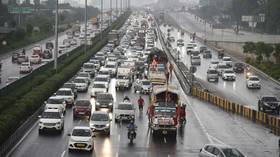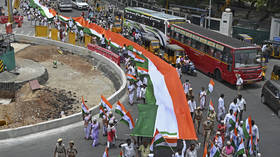India’s road network beats China’s - minister

India’s network of national highways, at 145,000 kilometers, is now the second-longest in the world after the US, according to Nitin Gadkari, the country’s minister for road transport and highways (MoRTH).
In the past nine years since the Narendra Modi-led Bharatiya Janata Party (BJP) government came to power, the total length of national highways in the country increased by about 59%, Gadkari told a press conference on Tuesday at the launch of a report by his ministry on the occasion of nine years of the Modi government.
The minister cited a nine-fold increase in toll revenues and a doubling of four-lane national highways during the interim period amid the government’s aggressive push for infrastructure development. Gadkari noted improvements at toll gateways in particular. “In 2014, the [average] waiting time at the toll plazas was 734 seconds (12 minutes), which has come down to only 47 seconds this year. We are hopeful that we will bring it down to 30 seconds soon,” he said.
He noted the transformative impact of the FASTag electronic toll-collection system, on motorists’ travel experience. He said it’s “revolutionized” toll payments and eliminated the need for cash transactions.
The ministry’s study revealed that the government saved 70 billion rupees ($853 million) in wasted fuel combustion, which was largely caused by longer waiting times at the nation’s toll plazas.
In a move to woo investors into the sector, Gadkari endorsed investment in the National Highway Authority of India’s Infrastructure Investment Trust, an instrument similar to mutual funds, enabling financing of infrastructure projects. Since its launch in November 2021, the trust has received a tremendous response, with an attractive interest rate of 8.05% surpassing traditional bank rates, the minister said.
Gadkari also laid out a vision for a greater push to adoption of electric vehicles (EVs) over the next five years, which seeks to promote clean energy and reduce carbon emissions, as the government strengthens its resolve on climate-control actions and sustainability drives.
A report in March from consultancy CRISIL noted that India’s MoRTH remains one of the most well-funded infrastructure ministries, second only to railways. Analysts note that around 10,500-11,500 kilometers will be constructed in the current fiscal year and nearly the same number in fiscal year 2024.
The BJP is known to champion the cause of infrastructure development. The Atal Behari Vajpayee-led government (1999-2004) launched the Golden Quadrilateral project, which was completed in 12 years at an estimated cost of $8.4 billion.













